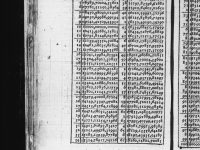Samuel Morland and his Calculator Machine
On December 30, 1695, English academic, diplomat, spy, inventor and mathematician Samuel Morland passed away. Morland was a polymath credited with early developments in relation to computing, hydraulics and steam power. He is probably best known for his designs of early calculator machines. Youth and Education Samuel Morland was born in Sulhamstead Bannister, Berkshire, England, the son of Thomas Morland, the rector of Sulhamstead Bannister parish church in Berkshire. Morland entered Winchester…
Read more





